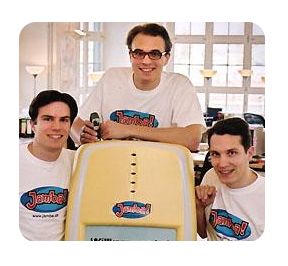Inform Technologies, a technology solution for established media brands, has received a $15 million investment from Spark Capital, a Boston-based venture fund focused on the intersection of the media, entertainment and technology industries.
The company said in their PR they are going to use the funds to accelerate growth. The company also claims nearly 100 media brands use Inform’s journalistic technology to enhance their sites. Â
Founded in 2004, Inform currently works with nearly 100 major media brands to help them ensure that their sites are ![]() content destinations and offers editorial-quality features that keep readers engaged on their sites longer – and that increase page views and revenue potential.
content destinations and offers editorial-quality features that keep readers engaged on their sites longer – and that increase page views and revenue potential.
Inform’s key offering is a technology solution that acts as an extra editor. It starts with a page of text, and then, with editorial precision, it automatically creates and organizes links to relevant content from the media property’s site, its archives, from affiliate sites and/or anywhere else on the Web. As a result, each page on a site becomes a richer multimedia experience.
Said James Satloff, CEO of Inform, “Media companies face significant challenges online. They need to attract new unique visitors, create an experience that compels those readers to spend more time consuming more pages, and then turn those page views and time on site into revenue. We believe that the Inform solution enables them to do exactly that.â€
Longstanding Inform clients include Conde Nast, Crain Communications, IDG, The New York Sun and Washington.Post.Newsweek Interactive. In recent months, 30 additional media properties have engaged Inform – many already running Inform’s technology on their sites.
Inform uses artificial intelligence and proprietary rules and algorithms to scan millions of pages of text and read the way a journalist does – identifying key “entities,†such as people, places, companies and products, and recognizing how they connect, even in subtle and context-specific ways. The software continually teaches itself – in real time – how information is related and automatically updates links and topics as the context changes.
Santo Politi, Founder and Partner at Spark Capital, commented on the following “Established media brands need cost-effective ways to compete with each other and, importantly, with other online presences, such as search. They need depth and richness in their content so they’re true destinations and so readers spend more time on the sites and click through more pages. Inform provides a truly elegant – and so far very successful – solution for that. While allowing the publication to remain in full control of its content and editorial integrity, Inform automatically enriches a site by enabling it to leverage its own content, its archives, archives of affiliates and the web overall. In effect, it enables a publication to expand its editorial capabilities without expanding its staff. We believe the potential for Inform’s growth is substantial.â€
 “We’re delighted that our new investor understands how effectively we partner with media companies and how our technology serves their business and editorial objectives. We will use the capital to expand our operations and implement our approach to accelerating our growth.†Said Joseph Einhorn, Co-Founder and CTO of Inform.
We went over Web and researched a bit over the company. It turns out the company has shifted the focus quite often over the past several years. In 2005 the company once said to be around to provide a useful news interface – both blog and non-blog – and to show the interconnectedness of all of the content. Later the same year a major re-launch and re-design struck the company and they have given up on the Ajax based pop-up and have also added vide and audio, which hardly fits into the concept of contextual connection between two content areas/texts based on their semantic textual analysis, unless they have come up to an idea how to read inside and understand image and video files. Google, by contrast, seems to have come up to technology that claims to recognize text in images. In late 2006 the company brought to the market their so called Inform Publisher Services, which was aimed at big web publishers, and was designed to help them increase page views by adding relevant links to other, hopefully related, content in their archives.
The new service was meant to automatically create links in existing articles, which link to a results page containing relevant content from the site as well as from the web, including blogs and audio/video content. Sounds like Sphere and LinkedWords. Basically their latest offering comes closer to what the Inform.com is today.
Some critics on the service have published the following doubts online over a few blogs we have checked out in regard to Inform.
Isn’t this the opposite of semantic web, since they’re sucking in unstructured data? How does their relatedness stuff compare to Sphere and how do their topic pages compare to Topix?
Marshall Kirkpatrick from RWW has put it that way when the question about standards and openness was raised.
“Inform crunches straight text and outputs HTML. I asked whether they publish content with any standards based semantic markup and they said that actual publishing is up to publishers. That’s a shame, I don’t see any reason why Inform wouldn’t participate in the larger semantic web to make its publishers’ content more discoverable. Perhaps when you’ve got 100 live clients and now $15m in the bank, it feels like there’s no reason to open up and play nice with a movement of dreamers having trouble getting other apps out of academia.â€
Competition include Sphere, Proximic, Lijit, Adaptiveblue, LinkedWords, somehow NosyJoe, Jiglu, among others. Other, although remote, players in this space include Attendi, Diigo, Twine and Freebase.
More about Inform
Inform Technologies is a new technology solution for established media brands that automatically searches, organizes and links content to provide a rich, compelling experience that attracts and retains readers.
With editorial-quality precision, the technology understands textual content and recognizes subtle differences in meaning. Further, the technology automatically creates links – in articles and on instantly generated topic pages – to relevant content. This deepens a site and engages readers.
Inform’s Essential Technology platform is an artificial intelligence and natural language-based solution that serves almost as an “extra editor” using rules and algorithms to “read” millions of pages of content, identify entities, such as people, places, companies, organizations and products, and topics, to create intelligent links to other closely related information. The technology is also able to recognize subtle differences in meaning and distinguish people, places and things based on local geographies or unique identities.
Inform’s Connected Content Solution and Essential Technology Platform are used by major media brands including CNN.com, WashingtonPost, Newsweek Interactive, Conde Nast, Meredith, IDG and Crain Communications.
Founded in 2004, the company is privately held and has approximately 60 employees, including mathematicians, linguists, programmers, taxonomists, library scientists and other professionals based in New York and India.
About Spark Capital
Spark Capital is a venture capital fund focused on building businesses that transform the distribution, management and monetization of media and content, with experience in identifying and actively building market-leading companies in sectors including infrastructure (Qtera, RiverDelta, Aether Systems, Broadbus and BigBand), networks (College Sports Television, TVONE and XCOM) and services (Akamai and the Platform). Spark Capital has over $600 million under management, and is based in Boston, Massachusetts. Spark has committed to investing $20 million in CNET equity.
More
http://www.inform.com/Â
http://www.inform.com/pr.012308.html
http://www.readwriteweb.com/archives/inform_funding.php
http://www.micropersuasion.com/2005/10/a_new_rss_reade.html
http://www.paidcontent.org/pc/arch/2005_10_16.shtml#051884
http://www.techcrunch.com/tag/inform.com/
http://blog.express-press-release.com/2007/10/19/a-bunch-of-intelligent-and-smart-content-tagging-engines/
http://www.techcrunch.com/2007/10/19/twine-launches-a-smarter-way-to-organize-your-online-life/
http://blog.nosyjoe.com/2007/09/06/nosyjoecom-is-now-searching-for-tags/
http://nextnetnews.blogspot.com/2007/09/is-nosyjoecom-next-clustycom.html
http://kalsey.com/2007/10/jiglu_tags_that_think/
http://mashable.com/2007/10/15/jiglu/
http://www.nytimes.com/2005/10/17/technology/17ecom.html
http://www.techcrunch.com/2005/10/16/informcom-doesnt/
http://www.techcrunch.com/2005/10/24/a-second-look-at-informcom/
http://www.techcrunch.com/2005/12/05/informcom-re-launches-with-major-feature-changes/
http://business2.blogs.com/business2blog/2006/07/scoop_inform_re.html
http://www.techcrunch.com/2006/07/30/informcoms-latest-offering/
http://www.quantcast.com/inform.com
http://bits.blogs.nytimes.com/2007/07/04/when-search-results-include-more-search-results/

 Little later they have also invested in the German Twitter clone,
Little later they have also invested in the German Twitter clone,  Facebook is hugely popular
Facebook is hugely popular 


 recommendations. By reaching consumers on a client’s web site, through email, and in
recommendations. By reaching consumers on a client’s web site, through email, and in  Robert was Chief Executive Officer of AdSpace Networks, where he led the company through rapid growth and strategic restructuring to focus on becoming a mall advertising network while also growing, and subsequently, divesting its CoolSign video merchandising enterprise business. Under his leadership as Chief Operating Officer at Blue Martini Software, a pioneer in e-commerce solutions, the market capitalization tripled, license revenue doubled, and net results increased by $40M. Prior to Blue Martini, Robert served as the Vice President of Corporate Development for Kellogg Company and as General Manager for its Lender’s Bagel Division. In addition to leading Kellogg’s external growth and acquisitions, he led the turnaround of the Lender’s Bagel Division, tripled its value, and divested the unit for nearly $300M. Preceding his tenure with the Kellogg Company, he was Managing Director and co-founder of Deloitte and Touche LLP’s Midwest Corporate Finance practice responsible for advising the region’s clients on acquisitions and joint ventures. Robert holds an MBA with High Distinction and a BSE from the University of Michigan.Â
Robert was Chief Executive Officer of AdSpace Networks, where he led the company through rapid growth and strategic restructuring to focus on becoming a mall advertising network while also growing, and subsequently, divesting its CoolSign video merchandising enterprise business. Under his leadership as Chief Operating Officer at Blue Martini Software, a pioneer in e-commerce solutions, the market capitalization tripled, license revenue doubled, and net results increased by $40M. Prior to Blue Martini, Robert served as the Vice President of Corporate Development for Kellogg Company and as General Manager for its Lender’s Bagel Division. In addition to leading Kellogg’s external growth and acquisitions, he led the turnaround of the Lender’s Bagel Division, tripled its value, and divested the unit for nearly $300M. Preceding his tenure with the Kellogg Company, he was Managing Director and co-founder of Deloitte and Touche LLP’s Midwest Corporate Finance practice responsible for advising the region’s clients on acquisitions and joint ventures. Robert holds an MBA with High Distinction and a BSE from the University of Michigan. 


 As a Google Qualified Company, a Yahoo! Ambassador and Microsoft adExcellence, Kenshoo provides its licensed SEM platform and services to publishers, agencies, blue-chip advertisers, and affiliate marketers world wide.
As a Google Qualified Company, a Yahoo! Ambassador and Microsoft adExcellence, Kenshoo provides its licensed SEM platform and services to publishers, agencies, blue-chip advertisers, and affiliate marketers world wide. approach (supplies on-demand, recommendations in context of the party, individuals, events, at the right time and place etc.) could be a viable business model in our understanding and this is where the site is planning to make money from, see below comments.
approach (supplies on-demand, recommendations in context of the party, individuals, events, at the right time and place etc.) could be a viable business model in our understanding and this is where the site is planning to make money from, see below comments. center (Natick, MA), has three employees for now. Formerly of Adobe Systems and Bose Corporation, Matt Douglas has 12+ years in product management and marketing with expertise in
center (Natick, MA), has three employees for now. Formerly of Adobe Systems and Bose Corporation, Matt Douglas has 12+ years in product management and marketing with expertise in  founded by Michael Arrington from
founded by Michael Arrington from 
 Mr. Li Ka-shing is the Chairman of Cheung Kong (Holdings) Limited and
Mr. Li Ka-shing is the Chairman of Cheung Kong (Holdings) Limited and 
